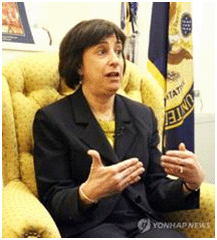
Market Information > 한국 농식품 시장뉴스
한국 농식품 시장뉴스
January 28, 2013
2013.01.28
1. ECONOMIC ISSUES
Korean Per Capita GNI Marked a Record High $22,720 in 2012 [Korean, OSY]
http://news.donga.com/3/all/20130127/52625680/1
Summary: According to the Korean Ministry of Planning & Finance, per capita GNI (Gross National Income) of Koreans amounted to a record high $22,720 in 2012, up 1 percent from the previous year. The Ministry commented that the growth rate of Korean GNI was half of GDP growth (2%) in 2012 largely due to the value rise of Korean won against U.S. dollar.
2. GRAIN & OILSEED ISSUES
Drought in USA, will price of beans and corns be changed? [Korean, BYY]
http://biz.chosun.com/site/data/html_dir/2013/01/20/2013012000791.html
The prices of beans and corns will be increased by far, even more expensive than last year which is the highest value so far. The United States of America, world`s biggest bean, corn producing area, prospects drought will be followed this year again. Meanwhile, harvesting beans major countries of South America such as Brazil and Argentina expect to produce greatest crops this year, thus price is not to be expected dramatic increase as last year.
3. LIVESTOCK ISSUES
The U.S. May Discuss Further Opening of Beef Market with Korea Soon [Korean, OSY]
http://www.yonhapnews.co.kr/economy/2013/01/24/0325000000AKR20130124113000071.HTML?template=2087

Korea to Host International Horse Race in 2013 for the First Time [Korean, OSY]
http://mbn.mk.co.kr/pages/news/newsView.php?news_seq_no=1293671
Summary: Korea Racing Authority (KRA) announced on January 24 that a Korea-Japan competition race was scheduled to take place in Gwachun race course, Seoul on September 1, 2013. This race was going to be expanded to an international horse race in 2014 with participation of additional countries including the U.S., Australia, Hong Kong and Macau. KRA explained that creation of international race will help local thoroughbred industry develop higher quality horses.
4. OTHER MISCELLANEOUS ISSUES
KFDA defines domestic distributed farm products, 99.7% safe [Korean, BYY]
http://news.kukinews.com/article/view.asp?page=1&gCode=cul&arcid=0006830287&cp=nv
After analyzing total 237 kinds of pesticide residues in 17 farm products distributed last year, KFDA defines 99.7% of farm products are safe level. KFDA additionally plans to examine about 280 kinds of pesticides including non-registered 50 kinds.
Open agriculture market, income conservation systems are necessary. [Korean, BYY]
http://mbceconomy.com/detail.php?number=707&thread=29
MIFAFF views damage caused by FTA between Korea-USA in future 15 years will be reached to 12 .660 trillion won in Agriculture, Fishery area, and up to 10% fall in poultry, pork, beef area. Many farmers in Korea disagree with FTA, but the fact that USA is the largest crop producing country in the world, and the biggest importing country at the same time, Korea has to face this big trade market and deal with the challenge ahead.
Most common concern is collapsing of agriculture-based culture as increased amount of farmers abandon farming when trade market widely opens. Lee Jung hwan, the chairman of FS&J Institute, thus insists to prevent people`s agitation as agricultural trade market opens, income conservation systems are necessary.
The information in this report was compiled by the Agricultural Trade Office (ATO) at the U.S. Embassy in Seoul, South Korea. The press summaries contained herein do NOT reflect USDA, the U.S. Embassy, or other U.S. government agency official policy or view point. U.S. food exporters can learn more about market opportunities in South Korea by reviewing ATO Seoul's Exporter Guide and other reports available at www.fas.usda.gov by clicking on "attaché report".
Agricultural Trade Office, U.S. Embassy - Seoul
Tel: 82-2-6951-6848 Fax: 82-2-720-7921
Email: atoseoul@state.gov